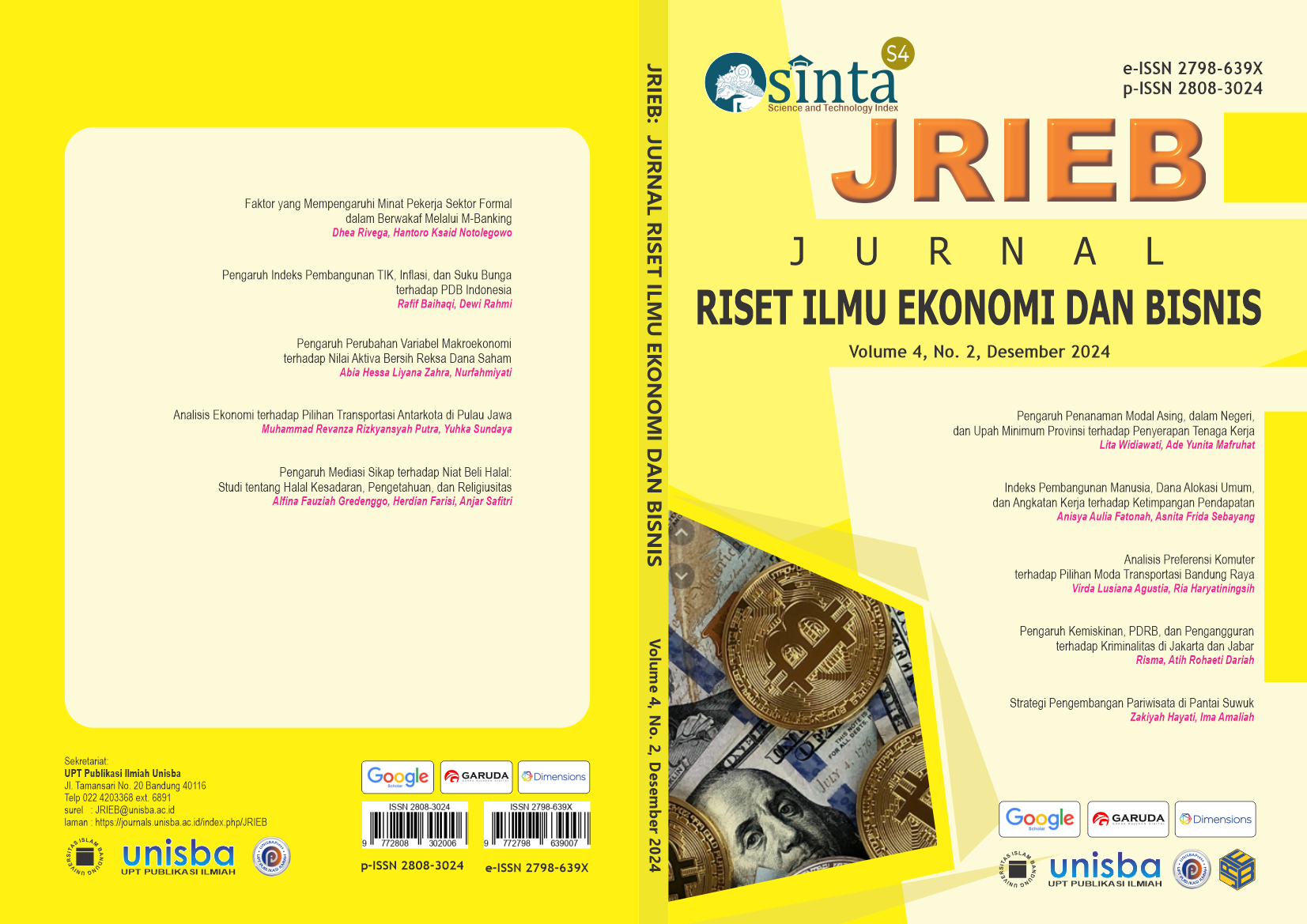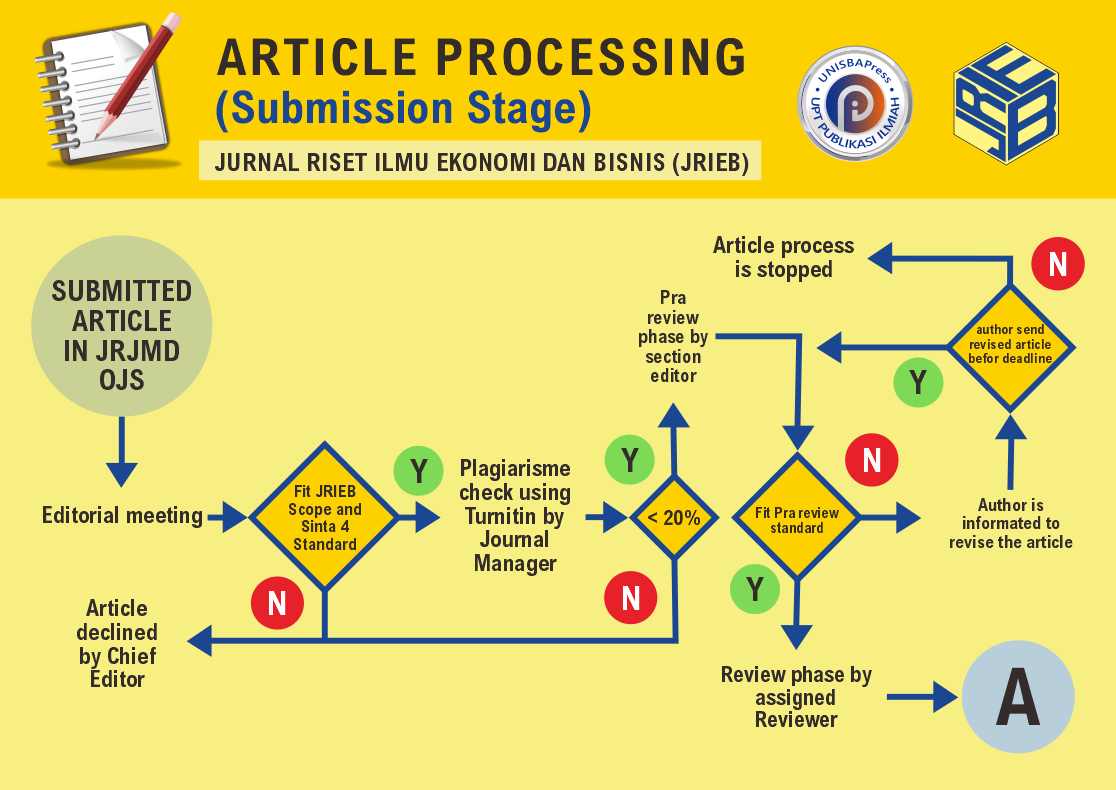Faktor yang Mempengaruhi Minat Pekerja Sektor Formal dalam Berwakaf Melalui M-Banking
DOI:
https://doi.org/10.29313/jrieb.v4i2.5028Keywords:
Minat Wakaf Uang, Mobile Banking Syariah, Bank Syariah IndonesiaAbstract
Abstrak. Penelitian ini bertujuan untuk menganalisis faktor-faktor yang memengaruhi minat berdonasi di kalangan pekerja sektor formal di Kota Bandung. Metode yang digunakan dalam penelitian ini adalah kuantitatif eksplanatif, dengan populasi yang mencakup seluruh pekerja di sektor formal dan sampel diambil dari para pekerja yang memiliki rekening mobile banking Syariah-BSI. Untuk menganalisis data, digunakan teknik Structural Equation Modeling (SEM) dengan bantuan perangkat lunak SMART-PLS. Hasil dari penelitian ini menunjukkan bahwa religiusitas, pengetahuan, persepsi risiko, dan kepercayaan memiliki pengaruh positif yang signifikan terhadap minat berdonasi. Tingkat religiusitas, pengetahuan, dan kepercayaan yang tinggi, serta persepsi risiko yang rendah, akan mendorong minat pekerja sektor formal untuk berdonasi melalui mobile banking Syariah. Sebagai rekomendasi, Bank Syariah Indonesia disarankan untuk: (1) meningkatkan program edukasi mengenai cara berdonasi melalui mobile banking Syariah, (2) mengembangkan fitur-fitur yang mampu meningkatkan kepercayaan nasabah, (3) memastikan pekerja di sektor formal memahami pentingnya berdonasi, (4) menawarkan undian atau insentif yang sesuai dengan prinsip syariah, dan (5) mempertahankan serta meningkatkan jam operasional layanan mobile banking Syariah untuk memperluas partisipasi masyarakat.
Abstract. This study aims to analyze the factors that influence the interest in donating among formal sector workers in Bandung City. The method used in this study is quantitative explanatory, with a population covering all workers in the formal sector and samples taken from workers who have a Syariah-BSI mobile banking account. To analyze the data, the Structural Equation Modeling (SEM) technique was used with the help of SMART-PLS software. The results of this study indicate that religiosity, knowledge, risk perception, and trust have a significant positive effect on the interest in donating. High levels of religiosity, knowledge, and trust, as well as low risk perception, will encourage the interest of formal sector workers to donate through Syariah mobile banking. As a recommendation, Bank Syariah Indonesia is advised to: (1) improve educational programs on how to donate via Sharia mobile banking, (2) develop features that can increase customer trust, (3) ensure that workers in the formal sector understand the importance of donating, (4) offer draws or incentives that are in accordance with Sharia principles, and (5) maintain and improve the operation of Sharia mobile banking services to expand community participation.
References
Abdul Shukor, S., Johari, F., Abd Wahab, K., Kefeli @ Zulkefli, Z., Ahmad, N., Haji Alias, M., Abdul Rahman, A., Mohd Orip, N. M., Ibrahim, P., & Abu-Hussin, M. F. (2019). Trust on awqaf institutions: evidence from Malaysia. Journal of Islamic Marketing, 10(2), 511–524. https://doi.org/10.1108/JIMA-05-2017-0054
Aiyubbi, D. El, Wijayanti, D., & Trisanty, A. (2021). Hubungan Antara Tingkat Pendidikan Masyarakat Terhadap Literasi Tentang Wakaf Tunai Dan Keputusan Untuk Berwakaf Tunai Di Daerah Istimewa Yogyakarta. Banking And Management Review, 10(2), 1476–1484. https://doi.org/Https://Doi.Org/10.52250/Bmr.V10i2.432
Ali, A. (2021). “The Role of Mobile Banking in Facilitating Islamic Charitable Donations: A Study on the Use of Mobile Banking for Waqf.”
Amin Abdul Rohman. (2022). Pengaruh Religiusitas, Pengetahuan, Perspesi, Pendapatan, dan Media Infromasi terhadap Minat Wakaf Uang Masyarakat Kota Bandung. Jurnal Riset Ilmu Ekonomi Dan Bisnis, 1(2), 136–144. https://doi.org/10.29313/jrieb.v1i2.513
Arfid Fathun Nadyan, & Dewi Rahmi. (2023). Pengaruh Pengetahuan, Religiositas, Persepsi, dan Media Informasi Terhadap Minat Investor Melakukan Wakaf Saham. Jurnal Riset Ilmu Ekonomi Dan Bisnis, 53–60. https://doi.org/10.29313/jrieb.v3i1.1926
Chandrasekhar, C. P., & Ghosh, J. (2015). “The Informal Sector and the Labour Market: Insights from India.”
Gibson-Light, M. (2017). Classification Struggles in Semi-Formal and Precarious Work: Lessons from Inmate Labor and Cultural Production (pp. 61–89). https://doi.org/10.1108/S0277-283320170000031002
Hardianto, D. S., & Wulandari, P. (2016). Islamic bank vs conventional bank: intermediation, fee based service activity and efficiency. International Journal of Islamic and Middle Eastern Finance and Management, 9(2), 296–311. https://doi.org/10.1108/IMEFM-01-2015-0003
Hati, S. R. H., Wibowo, S. S., & Safira, A. (2021). The antecedents of Muslim customers’ intention to invest in an Islamic bank’s term deposits: evidence from a Muslim majority country. Journal of Islamic Marketing, 12(7), 1363–1384. https://doi.org/10.1108/JIMA-01-2020-0007
Kasri, R. A., & Chaerunnisa, S. R. (2022). The role of knowledge, trust, and religiosity in explaining the online cash waqf amongst Muslim millennials. Journal of Islamic Marketing, 13(6), 1334–1350. https://doi.org/10.1108/JIMA-04-2020-0101
Kumar, R. (2020). “Mobile Banking: Concept, Features, and Future Prospects.”
Laila, N., Ratnasari, R. T., Ismail, S., Mohd Hidzir, P. A., & Mahphoth, M. H. (2023). The intention of small and medium enterprises’ owners to participate in waqf: the case of Malaysia and Indonesia. International Journal of Islamic and Middle Eastern Finance and Management, 16(3), 429–447. https://doi.org/10.1108/IMEFM-01-2022-0014
Nastiti, N. D., & Kasri, R. A. (2019). The role of banking regulation in the development of Islamic banking financing in Indonesia. International Journal of Islamic and Middle Eastern Finance and Management, 12(5), 643–662. https://doi.org/10.1108/IMEFM-10-2018-0365
Nurhaliza Novianty Tsania, & Yuhka Sundaya. (2023). Analisis Ekonomi Sikap Pekerja Migran Indonesia terhadap Risiko Kerja Luar Negeri. Jurnal Riset Ilmu Ekonomi Dan Bisnis, 117–124. https://doi.org/10.29313/jrieb.v3i2.2822
Rizal, H., & Amin, H. (2017). Perceived ihsan , Islamic egalitarianism and Islamic religiosity towards charitable giving of cash waqf. Journal of Islamic Marketing, 8(4), 669–685. https://doi.org/10.1108/JIMA-05-2015-0037
Shapland, J., & Heyes, J. (2017). How close are formal and informal work? International Journal of Sociology and Social Policy, 37(7/8), 374–386. https://doi.org/10.1108/IJSSP-06-2016-0071
Siswantoro, D. (2018). Sharia accounting standard for sukuk (Islamic bond) accounting in Indonesia. Journal of Islamic Accounting and Business Research, 9(3), 434–447. https://doi.org/10.1108/JIABR-11-2013-0040
Sugiyono. (2021). Metode Penelitian Kuantitatif, Kualitatif, dan R&D.













